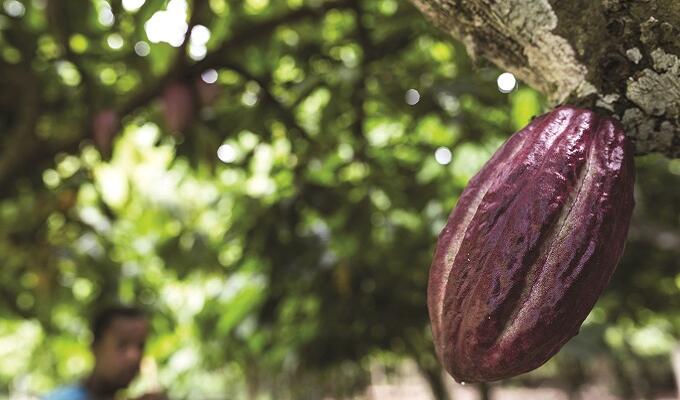

A roadmap towards a sustainable cocoa sector in Ghana
The world may face a shortage in cocoa supply within a few years according to the most recent Cocoa Barometer 2015 report. This is a consequence of a major problem not visible where consumers buy their chocolate: the world is running out of cocoa farmers.
Younger generations no longer want to be in cocoa production and older generations are approaching retirement. More distressingly, poverty is increasing in West Africa’s cocoa fields, where farmers’ share of profits decreased from 15% to between 4%-6% in the past 25 years. This phenomenon is accompanied by many other social, environmental and economic problems. Cocoa farmers are not receiving living wages and the value chain is being squeezed, leaving the cocoa sector’s sustainability at stake.
COCOA DECLINEIn Ghana, the world’s second-largest cocoa producer, the cocoa sector once accounted for 25% of GDP. Today this percentage is 7%. For at least 700,000 farmers in the West African country, cocoa production represents the principal portion of their income (70%-100%).
There is a need to raise awareness about critical issues that are presently not receiving sufficient attention and to thus initiate strategies to ensure the sustainability of the Ghanaian cocoa industry. While the private sector is increasingly aware that sustainable production and community development must be at the core of corporate strategy and daily operations, there is also a need to empower producers with better access to knowledge and technology to bridge the economic disparities along the value chain.
Developing a single strategy to tackle all existing problems is challenging and many critical issues exist involving a multitude of actors. Still, there is a way to ensure, stepby- step, more active participation of farmers within the supply chain, to share value with the cocoa industry and to increase their possibilities to earn living wages simultaneously.
THREE-STEP ROADMAPA roadmap with three main steps forms the basis for an effective response contributing towards a sustainable cocoa sector in Ghana:
- Share knowledge: There is already a pool of resources and expertise in the sector along the supply chain that needs to be visible to all. The real impact of sharing knowledge is only palpable if key actors of the value chain agree to participate in the activities to exchange experiences, knowledge and resources.
- Connect stakeholders: Brings disparate actors together using innovative technology to reduce obstacles to connecting upstream to downstream participants in the cocoa supply chain.
- Empower cocoa producers: Tackles producer problems by developing customized training and tools that contribute to solving the sustainability challenges they face.
This roadmap can be implemented within the framework of a partnership among private, international and national organizations willing to use a collaborative and innovative approach. This collaboration confronts the challenges of the cocoa sector to implement sustainable development practices on a pre-competitive base. The focus of such a partnership should be the wellbeing of all actors of the cocoa supply chain, especially those at the bottom of the chain, the farmers.
CHOCOTHONThe innovative and collaborative Chocothon Initiative is an interesting example of the development and implementation of such a roadmap including the three steps mentioned above. It is based on a partnership between the Trade for Sustainable Development (T4SD) programme of the International Trade Centre (ITC); the Google Food Lab (GFL); Business School Lausanne (BSL); the Future Food Institute; and the Crowdfooding platform.
The first Chocothon mission was held in January 2017 in Accra and Kumasi. The Chocothon team launched the first event that included knowledge-sharing steps throughout a three-day conference. It connected stakeholders by organizing a two-day hackathon, during which programmers, graphic designers, interface designers and project managers collaborated intensively on software innovation projects. As part of efforts to empower producers, an additional event took place in Kumasi, where cocoa producer representatives or producers’ coaches received a three-day training session in the use of market analysis and sustainability- related tools. The objective was to provide producers with better technical assistance regarding sustainable production.
The results indicated that the three-step approach can make a difference. The total number of direct beneficiaries of the Chocothon included 163 actors from the cocoa value chain in Ghana. The indirect figure of beneficiaries includes farmers who are now part of the cooperatives that were trained.
Sharing knowledge made actors in the cocoa sector aware of the challenges faced along the entire value chain. Connecting stakeholders provided software developers with enough information to develop an application, which can help solve one of the challenges identified in the conference; it is to be tested on the ground by buyers and farmers between the first and second phase of the Chocothon.
EMPOWERING PRODUCERSPerhaps more significantly, empowering producers resulted in 27 technicians from local organizations trained by ITC experts in the use of ITC market analysis and sustainability- related tools. Those trained beneficiaries were accredited by ITC as ‘Trainers on the ITC market analysis and sustainability tools’. They will be able to replicate training activities and provide technical assistance to producer cooperatives.
It is true that isolated interventions often have limited impact. However, when collaborative efforts follow roadmaps that allow experts, knowledgeable, buyers, producers, youth and marginalized producers to share, to connect and to empower each other, significant progress towards sustainable production can be achieved. The Chocothon initiative highlighted the relevance of this approach, which can be reproduced in any sector or developing country.



